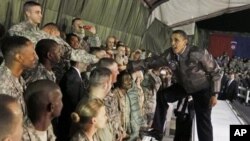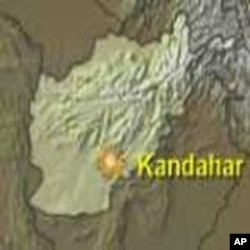Thousands of additional American forces are heading into southern Afghanistan, part of the troop surge that President Barack Obama has deployed to help end the Taliban-fuelled insurgency. Already, U.S. and coalition troops are increasing pressure in and around the southern city of Kandahar, where the Taliban have re-emerged and are threatening the population.
Military officials say the strategy behind the operation in Kandahar is to establish security so that ordinary Afghans can live their lives without fear of the Taliban.
U.S. Major General James Terry will take command of southern Afghanistan forces in the fall. He is visiting Kandahar to get a sense of what is happening and describes what the coming weeks will bring.
"You are going to see an uplift of forces come in and I think you'll start to see this tightening ring of security in and around Kandahar city that I think will then provide the security bubble for governance to start to take in and development to start to take root in Kandahar city," the major general said.
In Kandahar city itself, Afghan police and military forces are to take the lead in the operation. Their military units, called "Kandaks," will be supported by coalition troops.
Afghan security forces have improved a lot since General Terry was last here in 2006.
"Very encouraging, I think they've made a lot of significant progress especially in command and control and the quality of their Kandaks and their efficiency," he said.
Military officials acknowledge that Kandahar is the key to success in Afghanistan. The Taliban was founded outside the city in 1994, and have recently been flexing their muscles again. On May,22 this year, they even launched a ground attack on Kandahar air field, NATO's sprawling military base outside the city.
Canadian Ambassador William Crosbie welcomes the strategy to build up forces and establish security. Canadian forces led the vanguard here nearly five years ago says Crosbie.
"We have battled against the odds in a province that has become increasingly violent. It's a province that desperately needs development, and better security so we're delighted to have the American troops coming."
Crosbie desribes the U.S. commitment as more than just forces.
"They're not only bringing the opportunity to give Afghans more security, working closely with the Afghan national security forces, but bringing very important development dollars," said Crosbie.
Alongside the additional military forces, civilians have come as well in an effort to shore up the region's infrastructure and provide opportunities for the people. Tens of millions of dollars have been poured into projects to help the people, like a $50 million Afghan police compound that will open later this summer.
Ambassador Crosbie said there have already been many changes.
"The biggest area of progress is giving Afghans the ability to actually change their own future, through education, through training of teachers, through economic opportunities such as the rehabilitation of the Dahla Dam, restoring agriculture."
But no one believes success is assured, least of all the Afghans. One policeman told a senior military officer his children are virtually prisoners in their own home after he received repeated threats from Taliban militants, who have carried out a series of targeted assassinations against Afghans who work with or support the United States and NATO.





